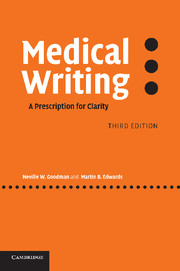Book contents
- Frontmatter
- Contents
- Preface to the first edition
- Preface to the third edition
- Acknowledgements
- PART I PROBLEM: THE ILLNESS
- PART II SOLUTION: SYMPTOMATIC RELIEF
- PART III PRACTICE: RECUPERATION
- 16 Some examples rewritten
- 17 Do the experts agree?
- Appendix: examples to rewrite
- References and further reading
- Index
17 - Do the experts agree?
Published online by Cambridge University Press: 23 November 2009
- Frontmatter
- Contents
- Preface to the first edition
- Preface to the third edition
- Acknowledgements
- PART I PROBLEM: THE ILLNESS
- PART II SOLUTION: SYMPTOMATIC RELIEF
- PART III PRACTICE: RECUPERATION
- 16 Some examples rewritten
- 17 Do the experts agree?
- Appendix: examples to rewrite
- References and further reading
- Index
Summary
Experts in the use of English argue about details as much as experts in medical subjects argue about the details of physiology, diseases and treatments. While in the preparation, parts of the first edition of this book were seen by many people. Changes made after the suggestions of one expert were often criticized by another. Books about English usage offer differing advice.
Look up the use of hyphens: ‘There are clear rules about the use of a hyphen’ and ‘There are no hard and fast rules …’.
The use of as or since to mean because is, according to one authority, ‘not acceptable’. According to another, ‘as is perfectly good English; but should be replaced by while or because if there is the possibility of confusion’. This last quotation has a semi-colon followed by but, yet there is advice that a semi-colon should never be followed by but.
‘Never start a sentence with however’ from one authority can be countered by another who holds that ‘Some pedantic users of English object to the use of but and however as the first word of a sentence’ and dismisses the argument for this as having ‘little to recommend it’.
Some object to X-ray and biopsy as verbs. The COD has them as verbs.
There are differences of opinion even on spelling.
- Type
- Chapter
- Information
- Medical WritingA Prescription for Clarity, pp. 229 - 230Publisher: Cambridge University PressPrint publication year: 2006



